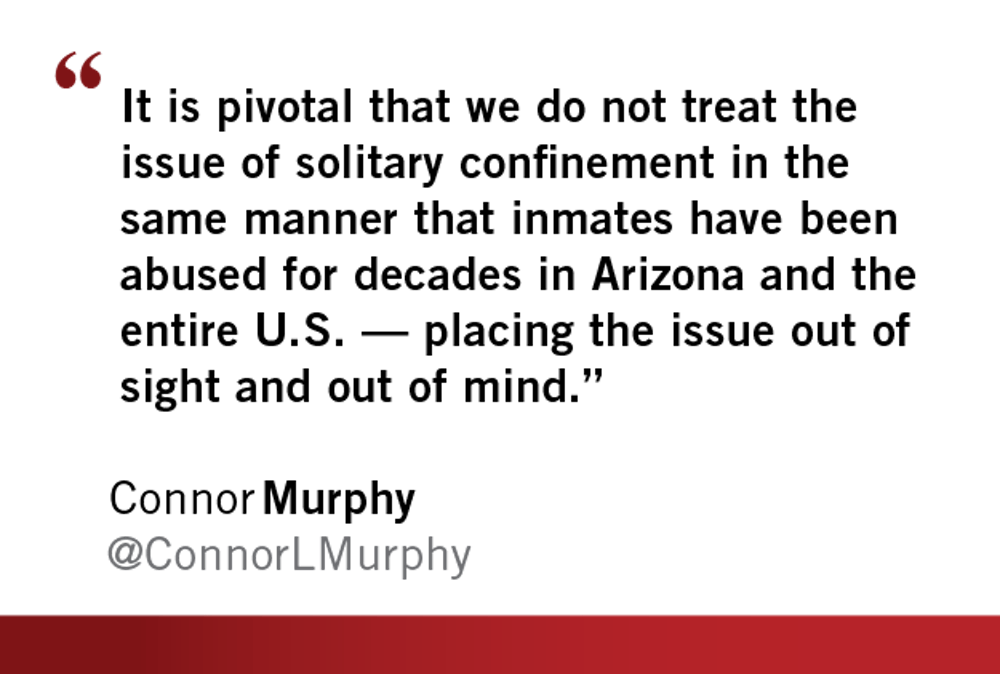Solitary confinement has been a staple of the U.S. penal system for decades. First instituted in the 1800s, the practice has continued to exist in some form or another. However, an ever-increasing amount of research suggests that the practice is incredibly detrimental to inmates, and can even pose a public safety risk.
Solitary Watch, a website dedicated to compiling information on the use (or more appropriately, overuse) of solitary confinement defines the practice as follows: “Solitary confinement is the practice of isolating a prisoner in a closed cell for 23 to 24 hours a day — often for weeks or months, and sometimes for years or decades at a time.”
Anyone with Internet access can see the detrimental effects of solitary for themselves.
In the PBS Frontline Documentary "Locked Up In America," available on Netflix, researchers follow inmates in the Maine State Prison to record the impact of solitary confinement on inmates. One inmate boasts before entering solitary that he is mentally strong and prepared for the worst. He quickly deteriorates, flooding his cell, repeatedly gives himself self-inflicted wounds, and even smears feces over himself just to get out of his cell.
Another inmate is given psychiatric treatment for months just to prepare himself for returning to solitary confinement. Upon being returned, he lasts a few hours in solitary before slashing his wrists and receiving medical treatment.
Nowhere are these examples more relevant than Arizona, where a class action lawsuit filed by the American Civil Liberties Union on behalf of over 33,000 Arizona inmates claiming inadequate health-care and detrimental overuse of solitary confinement was only just settled in December. The lawsuit was startling with overwhelming amounts of evidence presented by the ACLU from medical experts attesting to the disturbing conditions in Arizona prisons, forcing the Department of Corrections to settle the case.
The risks of solitary confinement — increased psychoses, violence, and recidivism on our streets — are not just hypotheticals by academics in far off states. They are the real-world impact of policies that Arizona has had in place for years, and is only now being forced to change.
In the recently resolved case between the Arizona chapter of the ACLU and the Arizona Department of Corrections, inmates were reportedly placed in solitary confinement simply because prisons had no other available spaces. In other instances, inmates were placed there just for disobeying a guard’s command. Even extreme violence may not justify submitting any human being to the cruel and unusual punishment of solitary confinement, but submitting a person to what is arguably torture because our prisons have run out of other living quarters or acted slightly out of line is unacceptable by any standards.
If the state wishes to allow solitary confinement, this treatment needs to be reserved for the worst of the worst, not just any prisoner. Moreover, as was demanded in the recent ACLU lawsuit against the Arizona DOC, such inmates still require basic medical and mental health services, or the state will transform criminals into monsters worse than they were before. Many who are currently sent to Arizona isolation cells are in prison for minor crimes; when they are released, would you prefer your neighbor to remember what it’s like to be a human being or not?
Today, Arizonans, and perhaps even all Americans, find themselves in a unique position to eradicate one of the most harmful practices endorsed by state and federal prisons — solitary confinement. The Arizona Department of Corrections has made significant concessions to improve the state of inmate health-care (including physical, dental and mental health services) and to reduce the use of solitary confinement. In fact, according to the Marshall Project, significant reforms have been enacted across the country over the last decade.
The good fight is not yet over. Seemingly overwhelming evidence exists to suggest that since its inception, solitary confinement has done nothing but gradually destroy the bodies and minds of those confined. While it is easy to congratulate the ACLU and Arizona DOC for cooperating on this matter, we must not forget that solitary confinement is still being actively used all across the nation, and poses significant health risks.
It is pivotal that we do not treat the issue of solitary confinement in the same manner that inmates have been abused for decades in Arizona and the entire U.S. placing the issue out of sight and out of mind, locking the door and throwing away the proverbial key.
Reach the columnist at burmasamoa@asu.edu or follow @ConnorLMurphy on Twitter.
Editor’s note: The opinions presented in this column are the author’s and do not imply any endorsement from The State Press or its editors.
Want to join the conversation? Send an email to opiniondesk.statepress@gmail.com. Keep letters under 300 words and be sure to include your university affiliation. Anonymity will not be granted.
Like The State Press on Facebook and follow @statepress on Twitter.





